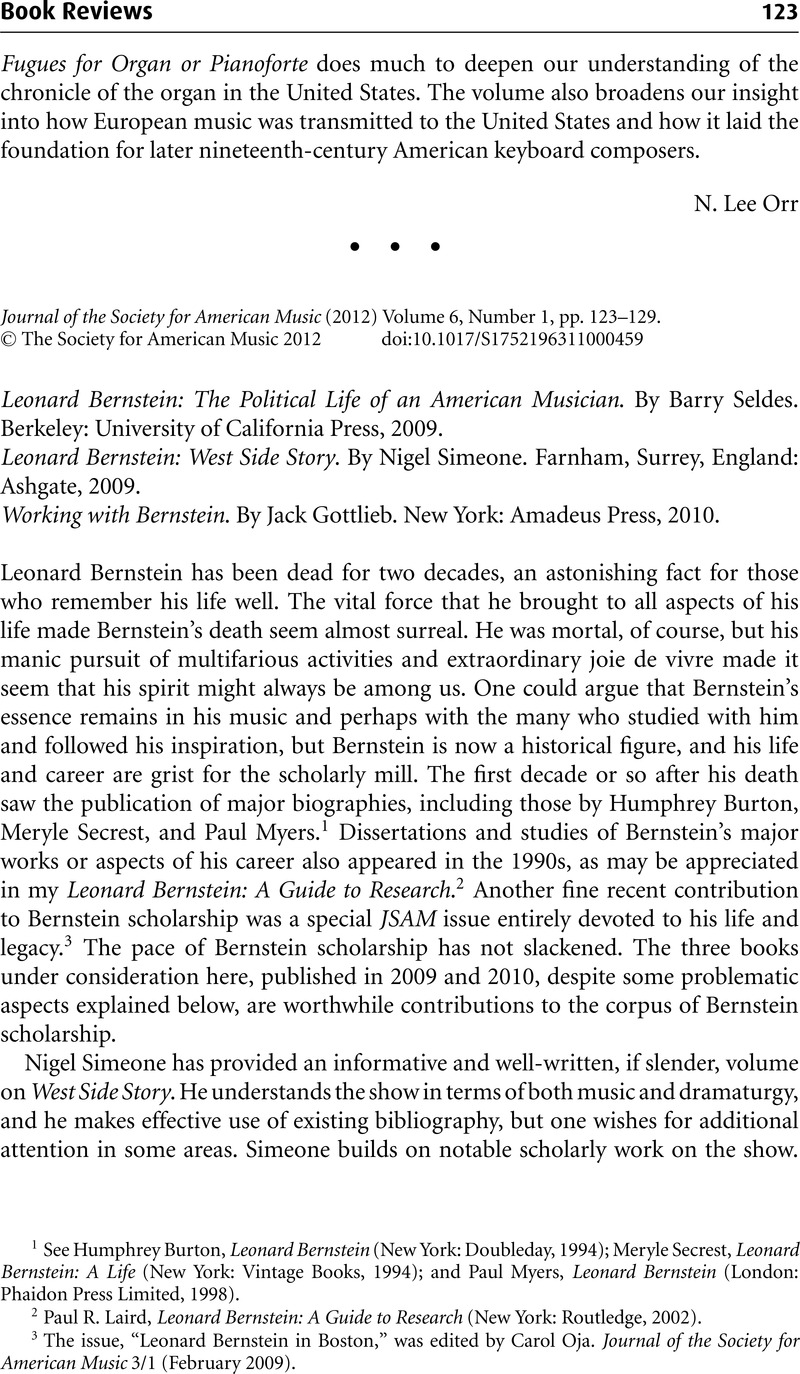No CrossRef data available.
Published online by Cambridge University Press: 20 February 2012

1 See Burton, Humphrey, Leonard Bernstein (New York: Doubleday, 1994)Google Scholar; Secrest, Meryle, Leonard Bernstein: A Life (New York: Vintage Books, 1994)Google Scholar; and Myers, Paul, Leonard Bernstein (London: Phaidon Press Limited, 1998)Google Scholar.
2 Laird, Paul R., Leonard Bernstein: A Guide to Research (New York: Routledge, 2002)Google Scholar.
3 The issue, “Leonard Bernstein in Boston,” was edited by Carol Oja. Journal of the Society for American Music 3/1 (February 2009).
4 Swain, Joseph P., The Broadway Musical: A Critical and Musical Survey (New York: Oxford University Press, 1990), 205–46Google Scholar; Block, Geoffrey, Enchanted Evenings: The Broadway Musical from Show Boat to Sondheim (New York: Oxford University Press, 1997), 245–73Google Scholar.
5 Swain and Block both cover the show's genesis, as does Banfield, Stephen in Sondheim's Broadway Musicals (Ann Arbor: University of Michigan Press, 1993), 31–38Google Scholar. Useful material also appears in Laurents, Arthur, Original Story By: A Memoir of Broadway and Hollywood (New York: Alfred A. Knopf, 2000), 327–69Google Scholar.
6 Oja, Carol J., “West Side Story and The Music Man: Whiteness, Immigration, and Race in the U.S. during the late 1950s,” Studies in Musical Theatre 3/1 (2009): 13–30CrossRefGoogle Scholar. Two new books that also provide varied perspectives on West Side Story are Wells, Elizabeth A., West Side Story: Cultural Perspectives on an American Musical (Lanham, MD: Scarecrow Press, 2011)Google Scholar, and Berson, Mischa: Something's Coming, Something Good: West Side Story and the American Imagination (New York: Applause Theatre & Cinema Books, 2011)Google Scholar.
7 Garebian, Keith, The Making of “West Side Story” (Toronto: ECW Press, 1995)Google Scholar.
8 See, for example, the transcript of a 1985 Dramatists Guild symposium that included the participation of Bernstein, Laurents, Robbins, and Sondheim that appears in Guernsey, Otis L. Jr., ed., Broadway Song & Story: Playwrights/Lyricists/Composers Discuss Their Hits (New York: Dodd, Mead & Company, 1985), 40–54Google Scholar. A useful interview with Carol Lawrence, the original Maria, appears in Burton, William Westbrook, ed., Conversations about Bernstein (New York: Oxford University Press, 1995), 169–89Google Scholar.
9 Bushard, Anthony, “From On the Waterfront to West Side Story, or There's Nowhere like Somewhere,” Studies in Musical Theatre 3/1 (2009): 61–75CrossRefGoogle Scholar.
10 For a discussion of Bernstein's reuse of material from West Side Story in Chichester Psalms (1965), see Laird, Paul R., The Chichester Psalms of Leonard Bernstein (Hillsdale, NY: Pendragon Press, 2010), 52–54Google Scholar, 101–25.
11 Jack Gottlieb, “The Music of Leonard Bernstein: A Study of Melodic Manipulations,” D.M.A. dissertation, University of Illinois, 1964.
12 Gottlieb, for example, is the author of the article “Symbols of Faith in the Music of Leonard Bernstein,” Musical Quarterly 66/2 (April 1980): 287–95; also see the first edition of his works catalog: Leonard Bernstein: A Complete Catalogue of His Works (n.p.: Amberson Enterprises, Publisher/Boosey & Hawkes, 1978). The catalog of Bernstein's compositions maintained by The Leonard Bernstein Office is now part of its Web site at www.leonardbernstein.com.
13 Chapin, Schuyler, Leonard Bernstein: Notes from a Friend (New York: Walker and Company, 1992)Google Scholar.
14 Peyser, Joan, Bernstein: A Biography, rev. ed. (New York: Billboard Books, 1998; first published New York: Beech Tree Books, 1987)Google Scholar.
15 Burton, Leonard Bernstein, 59–60.
16 “Wunderkind,” Time 69/5 (4 February 1957): 68–70, 72, 75.
17 The second movement of Chichester Psalms pointedly juxtaposes Psalms 23 and 2:1–4, a dramatic opposition of peaceful and violent texts, offering a possible interpretation as an antiwar message (Laird, The Chichester Psalms of Leonard Bernstein, 101–25).